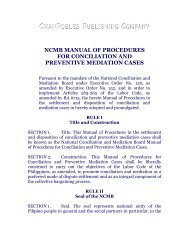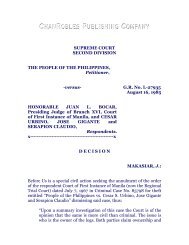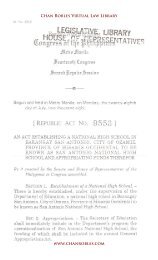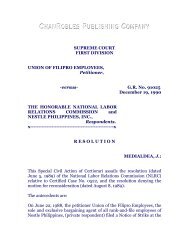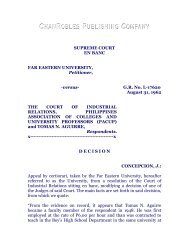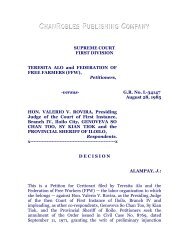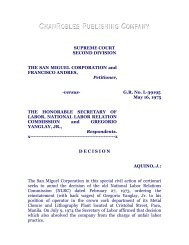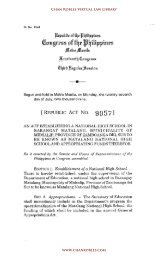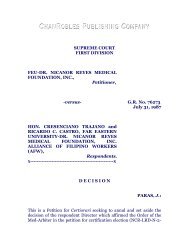L. T. Datu & Co., Inc. vs. NLRC, 253 SCRA 440, 453 - Chan Robles ...
L. T. Datu & Co., Inc. vs. NLRC, 253 SCRA 440, 453 - Chan Robles ...
L. T. Datu & Co., Inc. vs. NLRC, 253 SCRA 440, 453 - Chan Robles ...
You also want an ePaper? Increase the reach of your titles
YUMPU automatically turns print PDFs into web optimized ePapers that Google loves.
x x x<br />
The above-quoted memorandum negates the respondents’<br />
assertion that complainants were not terminated as well as their<br />
allegation that complainants refused to accept a new<br />
assignment in a new project. Said memorandum demonstrably<br />
shows that complainants were summarily dismissed without<br />
being afforded their rights to due process as mandatorily<br />
required under Article 277 of the Labor <strong>Co</strong>de. as amended. chanroblespublishingcompany<br />
If indeed the ten (10) workers involved including the herein two<br />
(2) complainants were not working although they reported for<br />
work and timed-in on July 19, 1991, what the respondents<br />
should have done was to require the subject workers to explain<br />
in writing why they should not be dealt (sic) with any<br />
disciplinary action including dismissal for their act of refusing<br />
to work and staying at the workers’ quarters. This is in line with<br />
the requirement of the law obligating employers to issue a prior<br />
notice stating the grounds for any termination and allowing the<br />
workers involved to explain their side. While the respondents<br />
have the prerogatives to dismiss and discipline their employees,<br />
nevertheless, they cannot disregard at will the mandatory<br />
requirements of the law before exercising such prerogatives.<br />
What we discern from the circumstances of the instant case is<br />
that complainants together with eight (8) other workers indeed<br />
protested the delay in the payment of their salaries, and by way<br />
of protest they simply refused to work on July 19, 1991 by<br />
staying inside the workers’ quarters. The complainants cannot<br />
be faulted from resorting to protest actions and part of the<br />
blame rests on the respondents. While the act of the<br />
complainants may not be tolerated, nonetheless, such act will<br />
definitely not justify the termination of said complainants’<br />
services. [8] chanroblespublishingcompany<br />
If petitioner really meant only to transfer private respondents to<br />
another project, the memorandum should have simply stated so. No<br />
word implying reassignment can be discerned in the said<br />
memorandum. Neither does it mention the project to which they



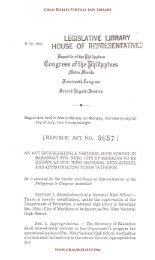
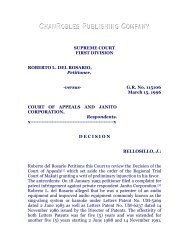
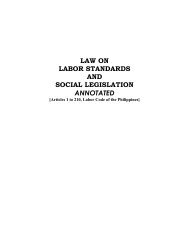
![Aurelio vs. NLRC, (221 SCRA 432 [1993]) - Chan Robles and ...](https://img.yumpu.com/51280528/1/190x245/aurelio-vs-nlrc-221-scra-432-1993-chan-robles-and-.jpg?quality=85)
